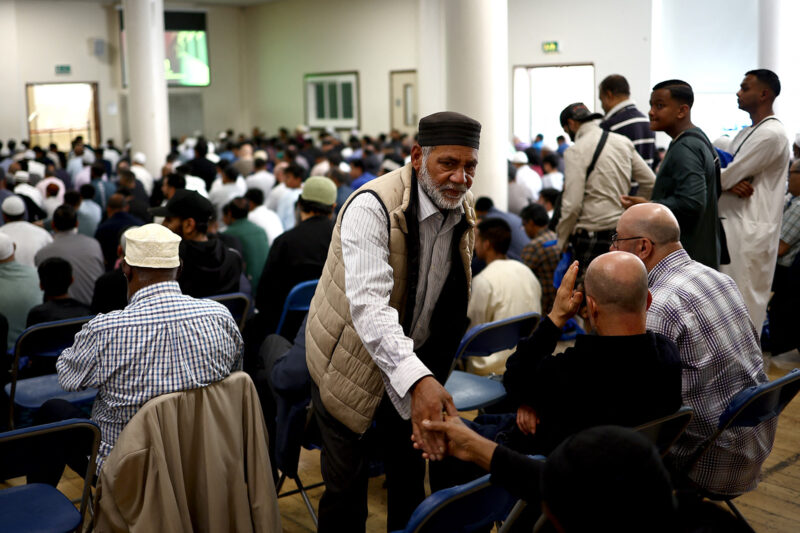
Muslim and minority renters are at the sharp end of London’s housing crisis
Invasive screening processes, including personal statements and social media monitoring, are creating ever greater opportunities for discrimination in an already inaccessible market
–
After a summer spent frantically searching for apartments in north London, Asma and three friends came across something strange in a tenancy application.
As a private tenant for more than a decade, the NGO worker knew that the London rental market had recently undergone radical changes: open viewings attracting flocks of house-hunters; the practice of taking sealed bids above and beyond the asking price, requests for refundable “viewing deposits” of up to £1,000 just to look at a property. She had, however, never heard of anyone being asked to write a personal profile as part of the application process.
Now, in addition to exhaustive credit and reference checks, Asma and her friends were being asked by estate agents to detail their hobbies and interests, why they wanted to live in a given area and who would be visiting the property if they were lucky enough to move in. She was puzzled what to say about herself. Surely, being able to afford the rent was enough?
“I just said I was ‘really keen to be part of the neighbourhood’, feeling kind of dirty as I was doing it,” Asma said.
One of her prospective flatmates, also a young Muslim woman of south Asian heritage, joked that if the landlord was so concerned about their ability to fit into the predominantly white, middle-class community where the flat was located, she would just say she was really into yoga.
Personal statements are just one of many increasingly onerous tenant screening practices that have emerged amid a dire shortage of London rental properties. According to data published in 2021 by the property-sharing site SpareRoom, for every seven people looking for a room in the capital, only one is available. Since 2019, rents have climbed by 26% in inner-city areas. Now, the average rent for a room is £989 per month, while the average one-bedroom flat costs £1,500-£1,600.
By nature, tenant screening practices have always worked in favour of the affluent. After all, landlords want people who can comfortably pay the high rents they are charging. But now, securing a place to live appears to be becoming an increasingly personal and humiliating process.
After a run of rejections in Crouch End, Forest Hill, Haringey and Hornsey, Asma’s group splintered off. They had been told by agencies that most landlords preferred to rent to families. If three or more separate individuals move into a property, forming more than one household, the owners have to apply for a licence to operate a house in multiple occupation.
Three months and 10 rejected offers later, Asma and the friend she was still searching with began to worry that race might also be counting against them. While looking in Walthamstow, east London, they noticed the people who appeared to be moving in there. “Very white, middle-class, nuclear families,” Asma said.
The whole experience had begun to feel all too familiar. In 2012, Asma had not been able to find a room in Stratford, owing to a housing shortage exacerbated by the area hosting that year’s Olympic and Paralympic games.
“As soon as I gave my name, I was asked, ‘Where are you from?’ It was as upfront as that,” she said of the many calls she made to estate agents. When she gave her hometown in the UK, rather than her family’s country of origin, she added, some abruptly hung up on her. “I felt that these past two months were just an evolution of that.”
In 2018, The Guardian reported that individuals named Muhammad were 20% less likely to receive positive responses to flatshare ads than those named David. Asma’s suspicions were reinforced by the fact that her and her friend’s combined wages were £10,000 above the threshold suggested for their budget by property affordability calculators. In other words, although agencies had officially recognised their incomes as more than adequate, they still couldn’t find anyone willing to let a home to them.
Finding accommodation is even more difficult for low-income families and individuals, and those who are unemployed or do not have good credit histories. Securing a place to live isn’t the end of the problems, either — especially for people from minority groups.
In June 2023, research by the Greater London Authority found that more than half of Black and Asian private tenants in London experienced difficulties paying their rent between 2016 and 2019, compared to around 35% of white renters. As property prices rise and demand shoots up, many low-income tenants have found themselves facing a stark choice: accept unaffordable rent hikes or look for cheaper property in an increasingly inaccessible market.
The UK housing crisis has been building since 1980,when the Conservative government of Margaret Thatcher introduced the “right to buy” policy, leading to a mass sell-off of social housing stock. According to the 2022 UK Housing Review, 40% of the properties sold ended up in the hands of private landlords. With little affordable or local authority housing being built to replace that which has been lost, the nation has become reliant on the private sector to meet its rental accommodation needs.
On top of that, the London rental market has come under increased pressures over the past couple of years. After an initial exodus to cheaper areas, many workers returned to the city following the easing of Covid-19 lockdown restrictions, increasing demand for properties. Now, the soaring interest rates caused by former prime minister Liz Truss’s mini-budget have forced a large number of buy-to-let investors to increase rents or sell up, further diminishing supply.
As Ella Chisholm, a spokesperson for SpareRoom, put it: “The housing market simply isn’t working for anyone. Renters and homeowners are struggling and landlords are continuing to leave the market.”
In an environment where the landlords that remain can pick and choose from a near-unlimited supply of would-be tenants, the scope for discrimination of all kinds is increased. While SpareRoom monitors the ads placed on its platform, investigates all reports of prejudice and has issued permanent bans to some users, Chisholm believes that solutions to the nation’s wider housing issues must come from government.
“There needs to be a real commitment to act fast and introduce legislation that eases the burden on renters and stabilises rental prices in the UK,” she said.
According to Nadia Hafedh, an organiser at the London Renters Union, laws protecting the privacy of renters would be a start — especially at a time when the screening processes used by landlords and letting agencies are becoming increasingly invasive.
“Landlords do not have to publish diversity data,” she said. “There is no accountability for them in the way they conduct these checks.”
“I’ve heard about requests for photographs and links to people’s social media,” she added, explaining that such practices leave renters from minority backgrounds at a particular disadvantage. “When you bring in things like having to prove that you are worthy of housing, then you are going to be subject to racialised ideals of what is a perfect tenant.”
While such practices almost certainly place members of minority groups at even more of a disadvantage than other renters, discrimination is difficult to prove, leaving many with little more than the nagging feeling that it has taken place. In September 2023, however, frustrated minority renters in Brussels reported far greater success in securing properties after sending white partners and friends to attend viewings on their behalf.
The campaign group Generation Rent believes that a large-scale programme of home building is the only way out of the current housing crisis. As chief executive Ben Twomey explained, “An increase in social housing — and homes more generally — is key to ending a situation where landlords get the pick of tenants who are queueing around the block for the opportunity to pay them rent. Enough homes for everyone will mean tenants have a choice in who they rent from, rebalancing the power and driving up standards.”
For the time being, such broad-based policies seem unlikely to win government support. In fact, political will to rein in an out-of-control rental market and address the needs of tenants has severely diminished in recent weeks, with ministers even pulling back from plans to outlaw no-fault section 21 evictions — a policy committed to in 2019 by then prime minister Theresa May.
That leaves renters to seek their own solutions, such as temporarily subletting rooms through networks of friends or leaving London altogether.
Asma opted for the latter, moving to Lewes, East Sussex. After repeated attempts to prove herself worthy of a place to live, she is thankful to have found a shared flat that she can afford. But that comes at a significant personal cost: she now faces a 120-mile round trip to see her family and the group of friends she has spent years building.
“Now, I’m uprooting all the support and community I have in London to live in a place where I don’t know anyone,” she said.
 Newsletter
Newsletter












